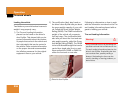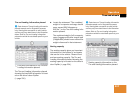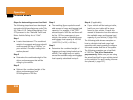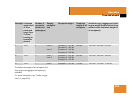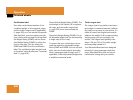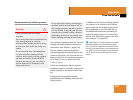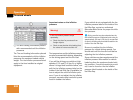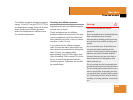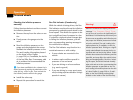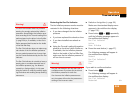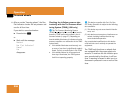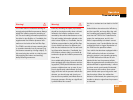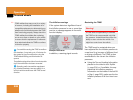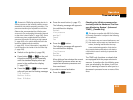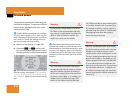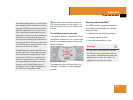
304
Operation
Tires and wheels
Checking tire inflation pressure
manually
Follow the steps below to achieve correct
tire inflation pressure:
̈ Remove the cap from the valve on one
tire.
̈ Firmly press a tire gauge onto the
valve.
̈ Read tire inflation pressure on tire
gauge and check against the recom-
mended tire inflation pressure on the
Tire and Loading Information placard
on the driver’s door B-pillar
(
୴ page 296) or, if available, the inside
of the fuel filler flap. If necessary, add
air to achieve the recommended tire
inflation pressure.
̈ Install the valve cap.
̈ Repeat this procedure for each tire.
Run Flat Indicator (Canada only)
While the vehicle is being driven, the Run
Flat Indicator monitors the set tire inflation
pressures by evaluating each wheel’s rota-
tional speed. This allows the system to de-
tect a significant loss of pressure in a tire.
If a wheel’s rotational speed changes due
to falling tire inflation pressure, you will
see a corresponding warning message in
the multifunction display.
The Run Flat Indicator may function in a
restricted manner or with a delay
ț if snow chains are mounted to the
vehicle
ț in winter road conditions prevail in
presence of ice and snow
ț if you are driving on a loose surface
(e.g. sand or gravel)
ț if you are driving in a very sporty man-
ner (involving rapid acceleration or high
speeds in curves)
i
If you have overfilled the tire, release tire in-
flation pressure by pushing the metal stem of the
valve with e.g. a tip of a pen. Then recheck the
tire inflation pressure with the tire gauge.
Warning! G
When the multifunction display shows the
message
Tire Pressure Check Tires
,
one or more of your tires is significantly un-
derinflated. You should stop and check your
tires as soon as possible, and inflate them to
the proper tire inflation pressure as indicat-
ed on the vehicle’s Tire and Loading Infor-
mation placard or, if available, on the tire
inflation pressure label. Driving on a signifi-
cantly underinflated tire causes the tire to
overheat and can lead to tire failure. Under-
inflation also reduces fuel efficiency and tire
tread life, and may affect the vehicle’s han-
dling and stopping ability. Each tire, includ-
ing the spare, should be checked monthly
when cold and set to the recommended tire
inflation pressure as specified on the Tire
and Loading Information placard on the driv-
er’s door B-pillar (
୴ page 296) or, if avail-
able, on the tire inflation pressure label
located on the inside of the fuel filler flap.



